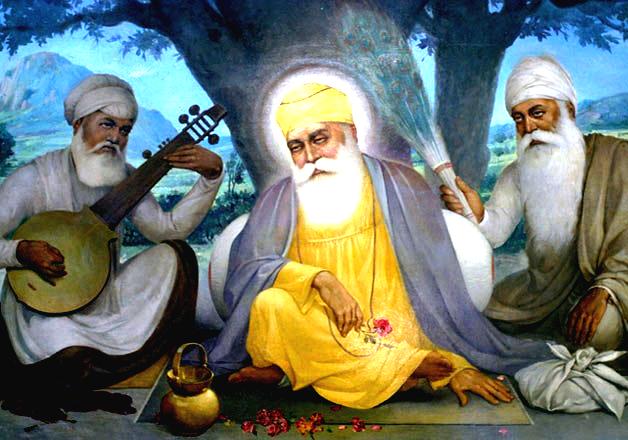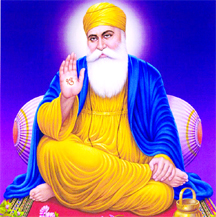
“There is but One God. His name is Truth. He is the Creator. He fears none. He is without hate. He never dies. He is beyond the cycle of births and death. He is self illumined; He is realized by the kindness of the True Guru. He was True in the beginning. He was True when the ages commenced and has ever been True. He is True now. He will ever be True. “— Guru Nanak
“Guru Nanak’s vision of life embraced all nations, all races and all times”, commented eminent Dr. K.T. Lalwani, author of Nanak, the Mystic. Another religious luminary, His Holiness Dalai Lama said of Guru Nanak, “Guru Nanak, due to his unique life style, is the brightest star among most brilliant ones in the sky.”
Guru Nanak was an early democrat. He preached and practiced the values of freedom and democracy long before any of the countries became a democratic nation. He always stood for equality of humans. He always championed the cause of the common people. A social reformer, par excellence, his was the voice of protest against injustice, inequality, oppression and tyranny. He gave to humanity the greatest gift-a way of living in this world so that life here in this world is a happy one and, on a spiritual level, bliss in the realms hereafter-“Lok sukhiye, parlok suhele”.
He recommended a life that was a balance between the physical and the spiritual, between the mundane and the heavenly. Guru Nanak preached against discrimination and prejudices due to race, caste, status, etc. He said: “See the brotherhood of all mankind as the highest order of Yogis; conquer your own mind, and conquer the world.” (SGGS page 6). Also, “There is one awareness among all created beings.”And finally, “One who recognizes the One Lord among all beings does not talk of ego”. He urges all the peoples of the world to “conquer” their minds to these evil practices. All human beings had the light of the Lord and were the same — only by subduing one’s pride and ego could one see this light in all.

Equality of women
In about 1499 when the world offered low to no status or respect to women, Guru Nanak sought to improve the respect of women by spreading this message: “From woman, man is born; within woman, man is conceived; to woman he is engaged and married. Woman becomes his friend; through woman, the future generations come. When his woman dies, he seeks another woman; to woman he is bound. So why call her bad? From her, kings are born. From woman, woman is born; without woman, there would be no one at all. 0 Nanak, only the True Lord is without a woman.” In so doing, he promoted women’s rights and equality – a first for the 15th century!
Universal message for all people
It had been a custom at the time for religious leaders to address only their own congregation and for segregation of the different religions –but Guru Nanak broke with tradition and spoke to all humanity. To the Muslim he said: “And when, O Nanak, he is merciful to all beings, only then shall he be called a Muslim; to the Hindus he said, “O Nanak, without the True Name, of what use is the frontal mark of the Hindus, or their sacred thread?; and to all he preached: “To take what rightfully belongs to another is like a Muslim eating pork, or a Hindu eating beef.”
Guru Nanak, the founder of the Sikh faith, lived at a momentous time in the history of India. His life spanned a period mid-way in ten centuries of foreign rule in India. The Hindu-Muslim conflict in the society and the tyranny of rulers of his time underpins much of Guru Nanak’s thought. He learned Persian and Arabic, the languages of the elite but he gave them up in favor of the language of the masses to whom he spoke directly, as did the Sufi mystics-Kabir and Farid- before him. His inspired utterances are known as the ‘baani’ from the Sanskrit word ‘vani’ meaning both sound and speech. So divine were they, far beyond the confines of orthodox thought and the temper of the times, that they became the basis of a fervent spirituality rather than a religion, spirituality with a universalistic outlook.
The son of a Kshatriya (warrior) family, Guru Nanak studied Hinduism and Islam. He got married but then he abandoned his family and became an ascetic. Wandering for many years he came under the influence of both Hindus and Muslims (especially Sufi). The Muslim teacher Kabir who died in 1398 made a deep impression on Guru Nanak. He said, “There is no Hindu, there is no Muscleman”.
Born in the month of ‘Kartik’ (October/November), his birthday is known as Guru Nanak Jayanti. He was born in 1469 A.D. at Talwandi some 30 miles from Lahore. He was a great seer, saint and mystic. He was a prolific poet and a unique singer of God’s laudation. A prophet of peace, love, truth and renaissance, he was centuries ahead of his times. His universal message is as fresh and true even today as it was in the past and Sikhs all over the world practice what Guru Nanak preached, to reaffirm their beliefs in the teachings of their founder.
It was during his stay in Sultanpur that Nanak attained Enlightenment, at the age of thirty-six. According to popular accounts, when he and Mardana (the Muslim rabab player, his friend from his birthplace, Talwandi, who became his constant companion) went for the customary dip in the river nearby, absorbed in thoughts of God, Nanak mysteriously disappeared. Mardana raised an alarm and searched for him everywhere. His biographers state that on the third day he reappeared changed in appearance, glowing with an unusual radiance. Nanak said that he had been ushered into Divine Presence, blessed by the Almighty and told to go forth and preach the holy name of God. It was to be the mission of his life thenceforth.






Be the first to comment